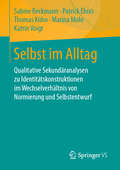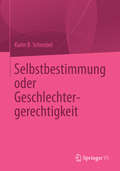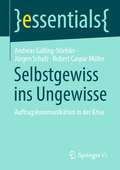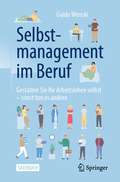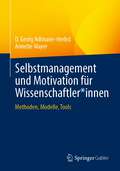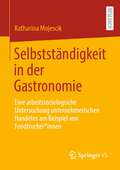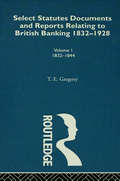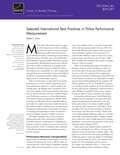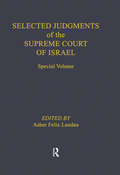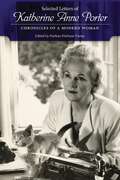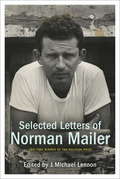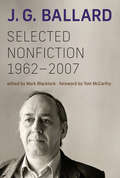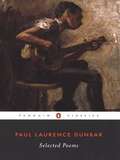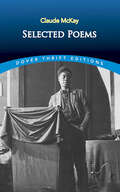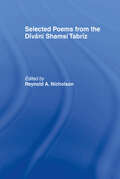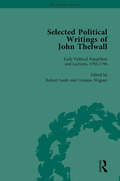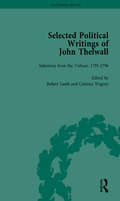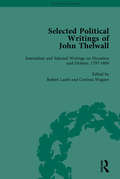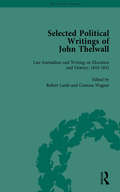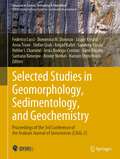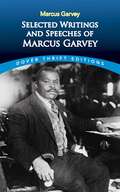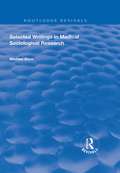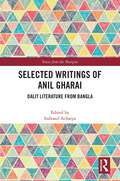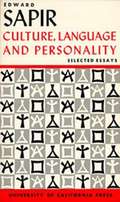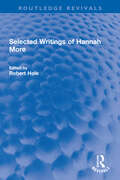- Table View
- List View
Selbst im Alltag: Qualitative Sekundäranalysen zu Identitätskonstruktionen im Wechselverhältnis von Normierung und Selbstentwurf
by Thomas Kühn Sabine Beckmann Patrick Ehnis Marina Mohr Katrin VoigtMithilfe von Sekundäranalysen qualitativer Interviews – geführt zwischen Ende der 1980er und Anfang der 2000er Jahre – analysieren die Autor*innen, wie sich gesellschaftliche Prozesse in der Arbeitswelt, im Geschlechterverhältnis sowie Einflüssen von Individualisierung, Aktivierung und Selbstoptimierung in der Konstruktion des Selbst niedergeschlagen. Erzählungen über Arbeit, Beziehung und Lebensführung verbinden die Autor*innen mit soziologischen und sozialpsychologischen Ansätzen zu Identitäts- und Subjektkonstruktionen. Dabei zeigen sie, wie der Kampf um Anerkennung, Autonomie und Authentizität, wie Zeitnutzungsdiskurse sowie Männlichkeits- und Weiblichkeitskonstruktionen das Alltagsleben und Lebensentscheidungen formen – stets im Spannungsfeld zwischen Unterordnung und Selbstermächtigung. Kritisch wird untersucht, wie Identitäts- und Subjektkonstruktionen mit der (Re)Produktion und (De)Legitimation sozialer Ungleichheitsverhältnisse zusammenhängen.
Selbstbestimmung oder Geschlechtergerechtigkeit
by Karin B. SchnebelSelbstbestimmung und Gerechtigkeit sind zwar allgemeine Wertvorstellungen, die jedoch in Konflikt zueinander geraten können. Auch das Ziel einer geschlechtergerechten Gesellschaft berührt dieses Spannungsfeld, da die Strategie gescheitert ist, Geschlechtergerechtigkeit über eine Ausblendung geschlechtlicher Unterschiede zu erreichen. Zwar ist es gelungen, Frauen stärker in der öffentlichen Sphäre zu verankern, doch kann ihre zivilisationsgeschichtlich starke Einbindung in das Private nicht übergangen werden. Die andere denkbare Möglichkeit Geschlechtergerechtigkeit herzustellen, ist die Anerkennung und Aufwertung der privaten, weiblich dominierten Sphäre. Hier wird gezeigt, dass eine Aufwertung des Privaten nur über eine stärkere Einmischung des Öffentlichen, also der Politik, in das Private geschehen kann, was zu einem Verlust von Autonomie führt. Es wird herausgearbeitet, dass die derzeitige Politik dabei ist, Frauen wieder stärker zu diskriminieren. Damit stellt sich die Frage: Wie kann ein liberaler Staat Geschlechtergerechtigkeit erreichen, ohne Werte wie Freiheit, Autonomie oder Selbstbestimmung zu gefährden?
Selbstgewiss ins Ungewisse: Auftragskommunikation in der Krise (essentials)
by Andreas Galling-Stiehler Robert Caspar Müller Jürgen SchulzDas letzte Jahrzehnt war geprägt von globalen Krisen: Finanz-, Flüchtlings-, Klima- und die Corona-Pandemiekrise haben Gewissheiten in Frage gestellt. In Gesellschaft, Wirtschaft und Politik wurde und wird von Menschen eine Anpassung an neue Bedingungen gefordert. Transformation erscheint als Gebot der Stunde. Dazu braucht es den Mut von Menschen und Organisationen, Bedrohungen entgegenzutreten sowie den vitalen Willen, Chancen zu ergreifen. Voraussetzung dafür ist Selbstgewissheit. Das Problem: Ungewisse Zeiten sind meist keine selbstgewissen. Es braucht den Austausch mit anderen Menschen, um Risiken gemeinsam einzugehen. Wir müssen uns mit den neuen Bedingungen ebenso vertraut machen wie mit- und untereinander, um zu neuen Gewissheiten zu gelangen. Anstatt Verständigung zu fördern, setzen Politik und Wirtschaft auf das Gegenteil: Paternalismus und Verhaltensökonomie sollen die Sinnsuche verkürzen. Das Gespräch soll durch sein Ergebnis ersetzt werden. Das ist eine Transformation, die auf Anpassungsdruck und Drohung setzt, weil sie Menschen wie Organisationen einen Wandel zum Guten letztlich nicht selbst zutraut. Die Autoren schlagen einen anderen Weg vor: selbstgewiss ins Ungewisse.
Selbstmanagement im Beruf: Gestalten Sie Ihr Arbeitsleben selbst - sonst tun es andere
by Guido WenskiDieses Buch beschreibt die vielfältigen Facetten des beruflichen Selbstmanagements. Welche Voraussetzungen müssen erfüllt sein, damit Arbeit Spaß macht, Erfolge ermöglicht und Sinn stiftet? An welchen Stellschrauben kann man drehen, um zufriedener durchs Job-Leben zu gehen und nicht zum Spielball von äußeren Umständen zu werden? Die gute Nachricht ist: Die meisten Aspekte können Sie selbst beeinflussen – seien es Berufs- und Stellenwahl, Zeitmanagement oder der Umgang mit Veränderungen und den persönlichen Ressourcen. Der Autor erläutert systematisch, welche Einflussfaktoren für eine glückliche, erfüllte Tätigkeit maßgeblich sind. Dabei spielen eine ausgeglichene Work-Life-Balance, sportliche Betätigung und persönliche Eigenschaften wie Offenheit, Realismus, Willensstärke, Resilienz und – oft unterschätzt – Humor eine wesentliche Rolle. Anhand von Beispielen aus dem Geschäftsalltag und dem privaten Bereich sowie zahlreichen Tipps und Hinweisen erfahren Sie, wie es gelingt, gleichzeitig motiviert, leistungsfähig, gesund und zufrieden zu bleiben oder zu werden. Das Buch räumt auch mit einigen weitverbreiteten Irrtümern und Fehleinschätzungen auf und macht deutlich: Sie müssen Ihr Berufsleben selber gestalten – sonst tun es andere!
Selbstmanagement und Motivation für Wissenschaftler*innen: Methoden, Modelle, Tools
by Annette Mayer D. Georg Adlmaier-HerbstIn diesem Buch lernen Sie wissenschaftlich fundierte Modelle kennen, mit denen Sie Ihr Selbstmanagement als Wissenschaftler*in systematisch und langfristig gestalten können. Im Zentrum des wissenschaftlichen Arbeitens steht der Inhalt. Jedoch ist auch gutes Selbstmanagement hilfreich, um zum optimalen Ergebnis zu gelangen. Selbstmanagement meint zum einen, sich für unliebsame oder herausfordernde Aufgaben zu motivieren, wie das langwierige Recherchieren in Bibliotheken, das Verfassen von Papers, das Fertigstellen von Dissertationen etc. Zum anderen bezeichnet Selbstmanagement auch das Verringern von negativen Gefühlen, wie Lampenfieber vor Präsentationen des eigenen Forschungsvorhabens, Unsicherheit vor wichtigen Gesprächen oder Konflikte mit Kollegen und Vorgesetzten. Gerade in Zeiten der zunehmenden Digitalisierung und der Arbeit im Homeoffice wird die eigene Motivation umso bedeutender, da oft die persönliche Ansprache und die Motivation durch den Kontakt und den Austausch im Team vermisst werden. Die Kernfrage lautet, wie Selbstmanagement im Einklang mit der eigenen Persönlichkeit und der eigenen Situation gelingen kann. Die Autoren leiten Sie an, eigene Stärken und Möglichkeiten als Ressourcen zu erkennen, diese wertzuschätzen und systematisch zu nutzen. Hierdurch können Sie auf eine neue, ressourcenorientierte Art mit sich umgehen und sich selbst ein wenig besser kennenlernen. Sie stellen positive Auswirkungen auf sich und andere fest und erweitern Ihren Entscheidungsspielraum sowie Ihr Handlungsrepertoire, auch in schwierigen Situationen.
Selbstständigkeit in der Gastronomie: Eine arbeitssoziologische Untersuchung unternehmerischen Handelns am Beispiel von Foodtrucker*innen
by Katharina MojescikStreetfood-Märkte und Foodtrucks haben sich als ein attraktives neues Beschäftigungsfeld in der Gastronomie etabliert. Diese explorative Studie rückt die unternehmerischen Personen in den Analysefokus, um die Selbstständigkeit in der (mobilen) Gastronomie vertiefend zu untersuchen. Dabei setzt sie an der Schnittstelle von Arbeits-, Ernährungs- und Kultursoziologie an, um das Arbeitshandeln von Foodtrucker*innen zu erklären. Es werden sowohl die Erwerbsform der (Solo-)Selbstständigkeit als auch die Branchenspezifika der Gastronomie in den Blick genommen und das internationale Phänomen Streetfood und Foodtrucks beschrieben. Das triangulative methodische Vorgehen und die gegenstandsoffene Forschungshaltung der Grounded Theory ermöglichen es, ein in Entstehung befindliches Branchenumfeld abseits des typischen arbeitssoziologischen Untersuchungsfeldes der abhängigen Erwerbsarbeit nicht nur zu beschreiben, sondern auch zu vielseitigen Befunden zu gelangen. Die empirischen Erkenntnisse liefern einen Einblick in die Einbettungsdimensionen, die Phasenhaftigkeit und unterschiedlichen Strategien unternehmerischen Handelns in der Gastronomie. Darüber hinaus sind die Erkenntnisse und das entwickelte theoretische Modell der mobilen Selbstständigkeit anschlussfähig an Diskurse zu neuen Formen der Erwerbsarbeit und „New Work“.
Select Statutes, Documents and Reports Relating to British Banking, 1832-1928: Volume 1
by T. E. GregoryFirst Published in 2006, This is Volume 1 covering the years of 1832 to 1844 that includes select documents and reports relating to British banking. It concentrates on the Bank of England before the Bank Act of 1844, and subsequent volumes include after the Act (II) the 1857 Crisis and joint stock banking, finishing with the return to the Gold Standard.
Selected International Best Practices in Police Performance Measurement
by Robert C. DavisHistorically, police agencies have measured their performance against a restricted set of crime-focused indicators, but modern police officers must be prepared to take on a wide variety of roles. Performance measures should be multidimensional to capture this complexity. This report describes some key considerations in designing measures to evaluate law enforcement agencies and includes a detailed review of some international best practices.
Selected Judgments of the Supreme Court of Israel
by Asher Felix LandauIs Judaism a religion or a nationality? Can a person claim Jewish nationality and, at the same time, no religion? Does conversion from Judaism prevent an individual from emigrating to Israel under the Law of Return?These questions were recently considered by the Israeli Supreme Court, and the judgments rendered are translated in this volume. Palestinian and Israeli statutes concerning immigration, nationalization, and registration are interpreted by the judges.
Selected Letters of Katherine Anne Porter: Chronicles of a Modern Woman
by Darlene Harbour UnrueKatherine Anne Porter (1890–1980) produced a relatively small body of fiction, but she wrote thousands and thousands of letters. The present selection of 135 unexpurgated letters, written to seventy-four different persons, begins with a 1916 letter written from a tuberculosis sanatorium in Texas and ends with a 1979 letter dictated to an unnamed nursing-home attendant in Maryland. Different from any previous selection, this body of letters does not omit Porter's frank criticism of fellow writers and spans her entire life. Within that circumscription is the chronicle of Porter, a twentieth-century woman searching for love while she struggles to become the writer who she is sure she can be. Porter's letters vividly showcase the twentieth century as the writer observes it from her historical vantage points—tuberculosis sanatoria and the influenza pandemic of 1918; the leftist community in Greenwich Village in the 1920s; the Mexican cultural revolution of the 1920s and early 1930s; the expatriate community in Paris in the 1930s; the rise of Nazism in Europe between the World Wars; the Second World War and its concomitant suppression of civil liberties; Hollywood and the university circuit as a haven for financially strapped writers in the 1940s and 1950s; the Cold War and its competition for supremacy in space; the women's rights and the civil rights movements; and the evolution and demise of literary modernism.
Selected Letters of Norman Mailer
by Norman Mailer J. Michael LennonA genuine literary event--an illuminating collection of correspondence from one of the most acclaimed American writers of all time Over the course of a nearly sixty-year career, Norman Mailer wrote more than 30 novels, essay collections, and nonfiction books. Yet nowhere was he more prolific--or more exposed--than in his letters. All told, Mailer crafted more than 45,000 pieces of correspondence (approximately 20 million words), many of them deeply personal, keeping a copy of almost every one. Now the best of these are published--most for the first time--in one remarkable volume that spans seven decades and, it seems, several lifetimes. Together they form a stunning autobiographical portrait of one of the most original, provocative, and outspoken public intellectuals of the twentieth century. Compiled by Mailer's authorized biographer, J. Michael Lennon, and organized by decade, Selected Letters of Norman Mailer features the most fascinating of Mailer's missives from 1940 to 2007--letters to his family and friends, to fans and fellow writers (including Truman Capote, James Baldwin, and Philip Roth), to political figures from Henry Kissinger to Bill and Hillary Clinton, and to such cultural icons as John Lennon, Marlon Brando, and even Monica Lewinsky. Here is Mailer the precocious Harvard undergraduate, writing home to his parents for the first time and worrying that his acceptances by literary magazines were "all happening too easy." Here, too, is Mailer the soldier, confronting the violence of war in the Pacific, which would become the subject of his masterly debut novel, The Naked and the Dead: "[I'm] amazed how casually it fits into . . . daily life, how very unhorrible it all is." Mailer the international celebrity pledges to William Styron, "I'm going to write every day, and like Lot's Wife I'm consigning myself to a pillar of salt if I dare to look back," while the 1980s Mailer agonizes over the fallout from his ill-fated friendship with Jack Henry Abbott, the murderer who became his literary protégé. ("The continuation of our relationship was depressing for both of us," he confesses to Joyce Carol Oates.) At last, he finds domestic--and erotic--bliss in the arms of his sixth wife, Norris Church ("We bounce into each other like sunlight"). Whether he is reflecting on the Kennedy assassination, assessing the merits of authors from Fitzgerald to Proust, or threatening to pummel William Styron, the brilliant, pugnacious Norman Mailer comes alive again in these letters. The myriad faces of this artist and activist, lover and fighter, public figure and private man, are laid bare in this collection as never before.
Selected Nonfiction, 1962-2007
by J. G. BallardJ. G. Ballard&’s collected nonfiction from 1962 to 2007, mapping the cultural obsessions, experiences, and insights of one of the most original minds of his generation.J. G. Ballard was a colossal figure in English literature and an imaginative force of the twentieth century. Alongside seminal novels—from the notorious Crash (1973) to the semi-autobiographical Empire of the Sun (1984)—Ballard was a sought-after reviewer and commentator, publishing journalism, memoir, and cultural criticism in a variety of forms. The Selected Nonfiction of J. G. Ballard collects the most significant short nonfiction of Ballard&’s fifty-year career, extending the range of the only previous collection of his nonfiction, A User&’s Guide to the Millennium (1996), which selected essays and reviews published between 1962 and 1995.A decade on from Ballard&’s death in 2009, a new generation of readers needs a new collection. In the period following A User&’s Guide, Ballard&’s writing addressed 9/11, British politics from New Labour onward, and what he termed &“the rise of soft fascism&”—a diagnosis that maintains its relevance amid a shift toward right populism in European and US politics. Beautifully edited by Ballard scholar and novelist Mark Blacklock, this volume includes Ballard&’s editorials and manifestos; commentaries on his own work; commentaries on the work of others; reviews; and more. Above all, it makes the case for the currency of Ballard&’s work at a contemporary juncture at which so many of his diagnoses concerning the media and politics have become apparent.
Selected Poems
by Paul Laurence Dunbar Herbert MartinPaul Laurence Dunbar was "the most promising young colored man" in nineteenth-century America, according to Frederick Douglass, and subsequently one of the most controversial. His plantation lyrics, written while he was an elevator boy in Ohio, established Dunbar as the premier writer of dialect poetry and garnered him international recognition. More than a vernacular lyricist, Dunbar was also a master of classical poetic forms, who helped demonstrate to post-Civil War America that literary genius did not reside solely in artists of European descent. William Dean Howells called Dunbar's dialect poems "evidence of the essential unity of the human race, which does not think or feel black in one and white in another, but humanly in all."
Selected Poems (Dover Thrift Editions)
by Claude MckayIn his 1918 autobiographical essay, "A Negro Poet Writes," Claude McKay (1889-1948), reveals much about the wellspring of his poetry."I am a black man, born in Jamaica, B.W.I., and have been living in America for the last years. It was the first time I had ever come face to face with such manifest, implacable hate of my race, and my feelings were indescribable ... Looking about me with bigger and clearer eyes I saw that this cruelty in different ways was going on all over the world. Whites were exploiting and oppressing whites even as they exploited and oppressed the yellows and blacks. And the oppressed, groaning under the leash, evinced the same despicable hate and harshness toward their weaker fellows. I ceased to think of people and things in the mass. [O]ne must seek for the noblest and best in the individual life only: each soul must save itself."So wrote the first major poet of the Harlem Renaissance, whose collection of poetry, Harlem Shadows (1922), is widely regarded as having launched the movement. But McKay's literary significance goes far beyond his fierce condemnations of racial bigotry and oppression, as is amply demonstrated by the universal appeal of his sonnet, "If We Must Die," recited by Winston Churchill in a speech against the Nazis in World War II.While in Jamaica, McKay produced two works of dialect verse, Songs of Jamaica and Constab Ballads, that were widely read on the island. In richly authentic dialect, the poet evoked the folksongs and peasant life of his native country. The present volume, meticulously edited and with an introduction by scholar Joan R. Sherman, includes a representative selection of this dialect verse, as well as uncollected poems, and a generous number in standard English from Harlem Shadows.
Selected Poems from the Divani Shamsi Tabriz
by Reynold A. NicholsonSelection of the lyrical poetry of Jalaluddin Rumi.
Selected Political Writings of John Thelwall Vol 1
by Robert Lamb Corinna WagnerJohn Thelwall was London Corresponding Society's most prominent orators and was tried for high treason along with Thomas Hardy and John Horne Tooke in 1794. This edition brings together Thelwall's most important political writing ranging from scientific pamphlets and writings on the art of elocution, to political philosophy and journalism.
Selected Political Writings of John Thelwall Vol 2
by Robert Lamb Corinna WagnerJohn Thelwall was London Corresponding Society's most prominent orators and was tried for high treason along with Thomas Hardy and John Horne Tooke in 1794. This edition brings together Thelwall's most important political writing ranging from scientific pamphlets and writings on the art of elocution, to political philosophy and journalism.
Selected Political Writings of John Thelwall Vol 3
by Robert Lamb Corinna WagnerJohn Thelwall was London Corresponding Society's most prominent orators and was tried for high treason along with Thomas Hardy and John Horne Tooke in 1794. This edition brings together Thelwall's most important political writing ranging from scientific pamphlets and writings on the art of elocution, to political philosophy and journalism.
Selected Political Writings of John Thelwall Vol 4
by Robert Lamb Corinna WagnerJohn Thelwall was London Corresponding Society's most prominent orators and was tried for high treason along with Thomas Hardy and John Horne Tooke in 1794. This edition brings together Thelwall's most important political writing ranging from scientific pamphlets and writings on the art of elocution, to political philosophy and journalism.
Selected Studies in Geomorphology, Sedimentology, and Geochemistry: Proceedings of the 3rd Conference of the Arabian Journal of Geosciences (CAJG-3) (Advances in Science, Technology & Innovation)
by Jasper Knight Sandeep Panda Broder Merkel Stefan Grab Sami Khomsi Amjad Kallel Santanu Banerjee Haroun Chenchouni Domenico M. Doronzo Helder I. Chaminé Jesús Rodrigo-Comino Federico Lucci Anna TravéThis book is based on the papers accepted for presentation during the 3rd Springer Conference of the Arabian Journal of Geosciences (CAJG-3). The book is of interest to all researchers in the fields of geomorphology, sedimentology, and geochemistry. Papers in the field of geomorphology deal with topics related to fault slip and incision rates, soil science, landslides and debris flows, coastal processes, and geoarcheology and geoheritage. Papers in the field of sedimentology cover research studies in stratigraphy and environmental, tectonic, and diagenetic processes, together with studies focusing on the evolutionary, biostratigraphic, and paleo-environmental significance of paleontology. This section also contains papers on marine geosciences, from molecular proxies related to climate to geophysical surveys. The third set of papers focuses on studies related to geochemistry that are focused on sedimentary geochemistry and mineralogical characterization, magmatic and metamorphic processes and products, and the origin and exploration of mineral deposits. This book resumes the current situation related to the abovementioned topics mainly in the Mediterranean realm and its surroundings. The book is of interest to all researchers, practitioners, and students in the fields of geomorphology, sedimentology, and geochemistry.
Selected Writings and Speeches of Marcus Garvey (Dover Thrift Editions: Black History)
by Marcus GarveyOne of the most important and controversial figures in the history of race relations in America and the world at large, Marcus Garvey was the first great black orator of the twentieth century. The Jamaican-born African-American rights advocated dismayed his enemies as much as he dazzled his admirers. Of him, Martin Luther King, Jr., said, “He was the first man, on a mass scale and level, to give millions of Negroes a sense of dignity and destiny, and make the Negro feel that he was somebody.”A printer and newspaper editor in his youth, Garvey furthered his education in England and eventually traveled to the United States, where he impressed thousands with his speeches and millions more through his newspaper articles. His message of black pride resonated in all his efforts. This anthology contains some of his most noted writings, among them “The Negro’s Greatest Enemy,” "Declaration of the Rights of the Negro Peoples of the World," and "Africa for the Africans," as well as powerful speeches on unemployment, leadership, and emancipation.Essential reading for students of African-American history, this volume will also serve as a useful reference for anyone interested in the history of the civil rights movement.
Selected Writings in Medical Sociological Research (Routledge Revivals)
by Michael BloorFirst published in 1997, this self-selection of the writings of Michael Bloor, Reader at the University of Wales Cardiff, embraces papers on qualitative research findings, on qualitative methods, and on empirically-based theorising. It includes some material which is little known (for example, a rare observational study of illness behaviour) as well as some of Bloor’s best regarded papers. This selection from an expert with more than twenty five years of research experience in the field of sociology of health and illness and nearly a hundred previous academic publications will be of interest to students of medical sociology, to methodologists, and to nurses, clinicians, and others interested in qualitative research in health and illness.
Selected Writings of Anil Gharai: Dalit Literature from Bangla (Voices from the Margins)
by Indranil AcharyaAnil Gharai is arguably one of the most significant authors of Bangla Dalit literature. His works deal with the stark everyday realities of people on the margins and the complex interplay of domination and subjugation in these spaces. This volume of English translations of some of his most celebrated works seeks to introduce his writings to a new readership in India and abroad. In his works, Gharai explored caste-based and gender-based oppression in the rural areas of coastal Bengal. His protagonists are from remote spaces, from the Dalit community or the indigenous communities—men and women who work and live in extremely exploitative circumstances and whose lives are depicted by Gharai with great care and detail. His novels, short stories and poems, translated in this volume, give voice to the unrepresented and offer a critique of the oppressive caste and class hierarchies and traditions in eastern India. He also focuses on the replication of patriarchal mores within Dalit society and culture. This volume includes critical essays on Anil Gharai and his long interview to reflect on his position in the alternative literary canon of Bangla Dalit literature. Part of the Voices from the Margins series, this critical edition seeks to visibilise the less visible literary texts and traditions. It will be of interest to those scholars engaged in contemporary Indian/South Asian literary cultures, comparative literature, modern Indian literature, minority studies, Dalit studies and gender studies. It will also be useful to students and researchers of social sciences and humanities.
Selected Writings of Edward Sapir in Language, Culture and Personality
by Edward Sapir David G. MandelbaumThe interplay of culture and personality was a field where many of the essays of Edward Sapir have become classics in the social sciences. The nine contributions brought together in this volume well show the distinction and lasting quality of Sapir's work. They include "Culture, Genuine and Spurious," "The Meaning of Religion," "Language," "Cultural Anthropology and Psychiatry," and "The Statue of Linguistics as a Science."
Selected Writings of Hannah More (Routledge Revivals)
by Robert HoleFirst published in 1996, Selected Writings of Hannah More brings together some of More’s most powerful work, illustrating her views on the proper role of women in all areas of society. Hannah More was a member of the London literary scene and is known for her morally restrictive and politically reactionary views, confronting the arguments of radicals and feminists alike. The book explores a number of More’s key works and includes a selection of her Letters from London in the 1770s, reflecting on the state of society. Also examined are several of More’s poems and short stories. Selected Writings of Hannah More will appeal to those with an interest in social, cultural, and literary history.
